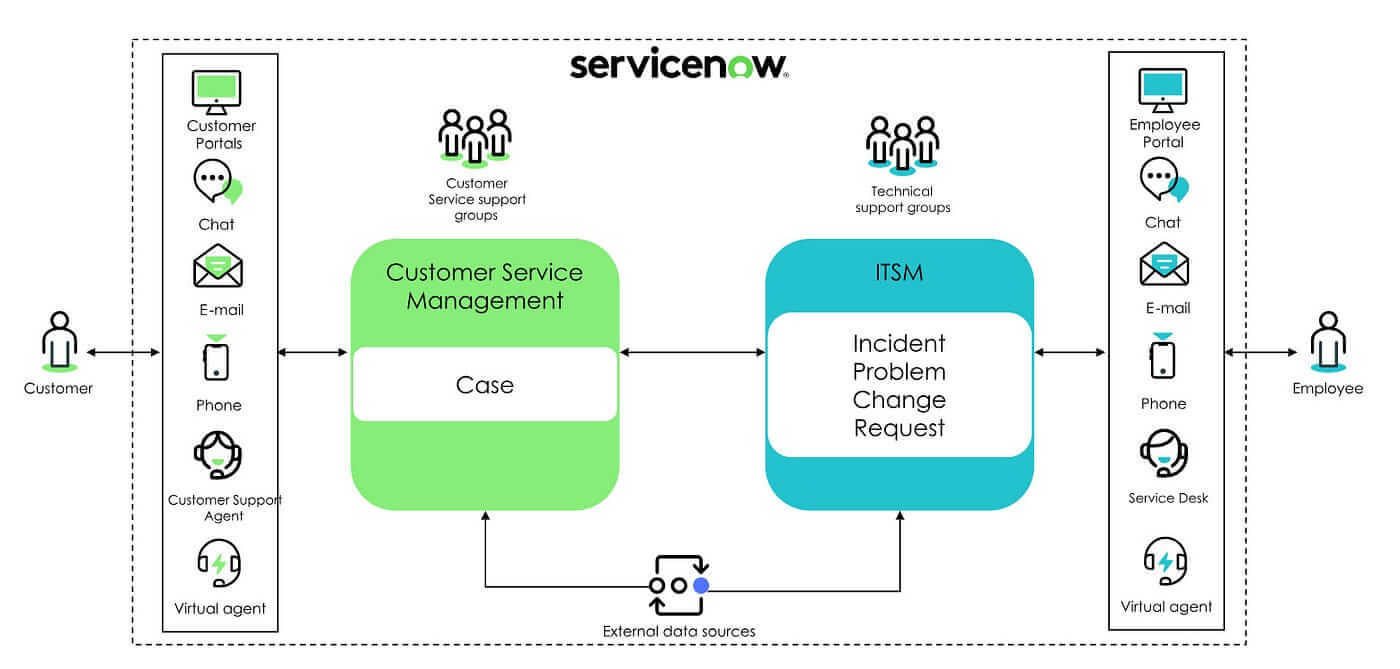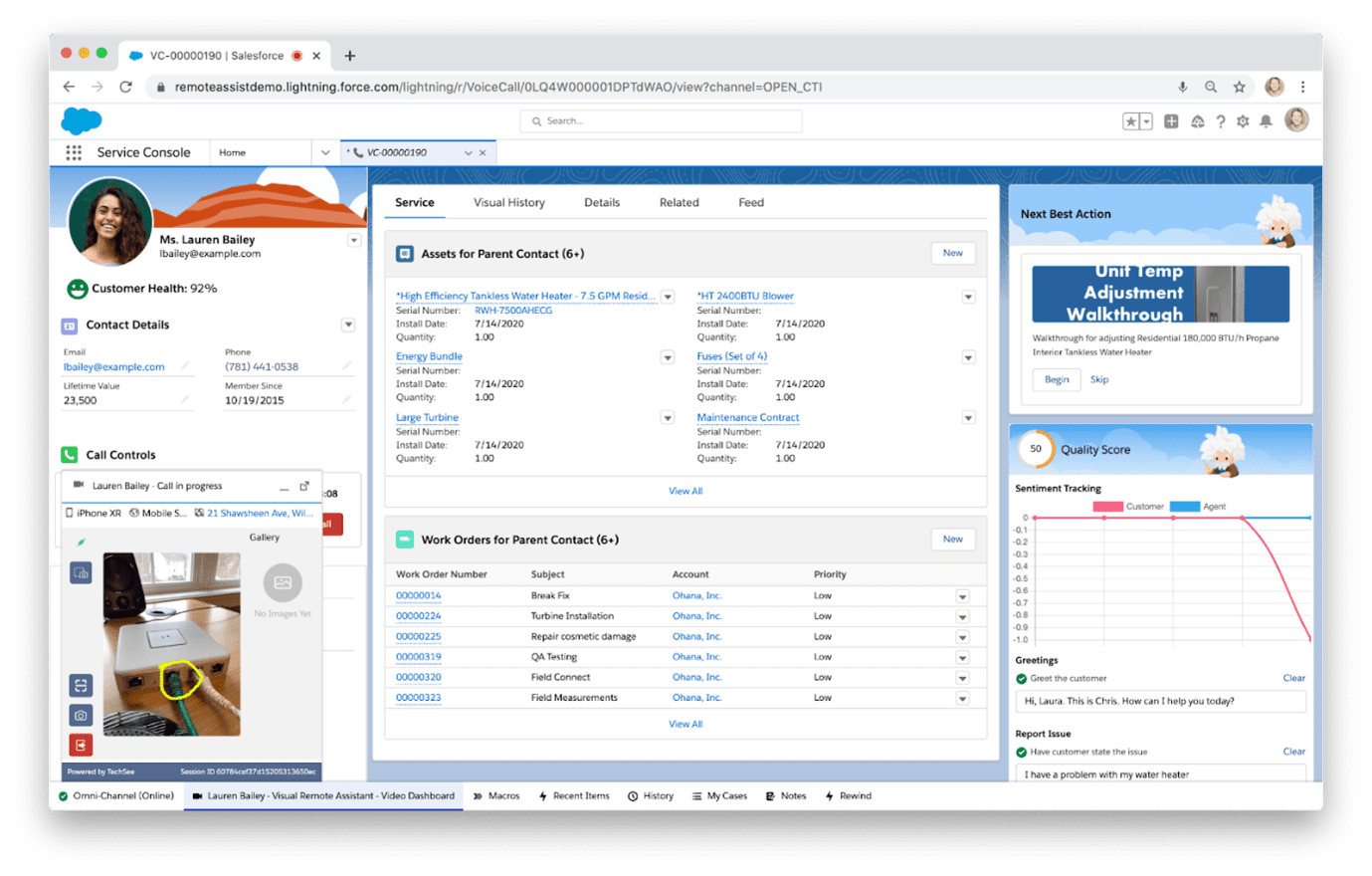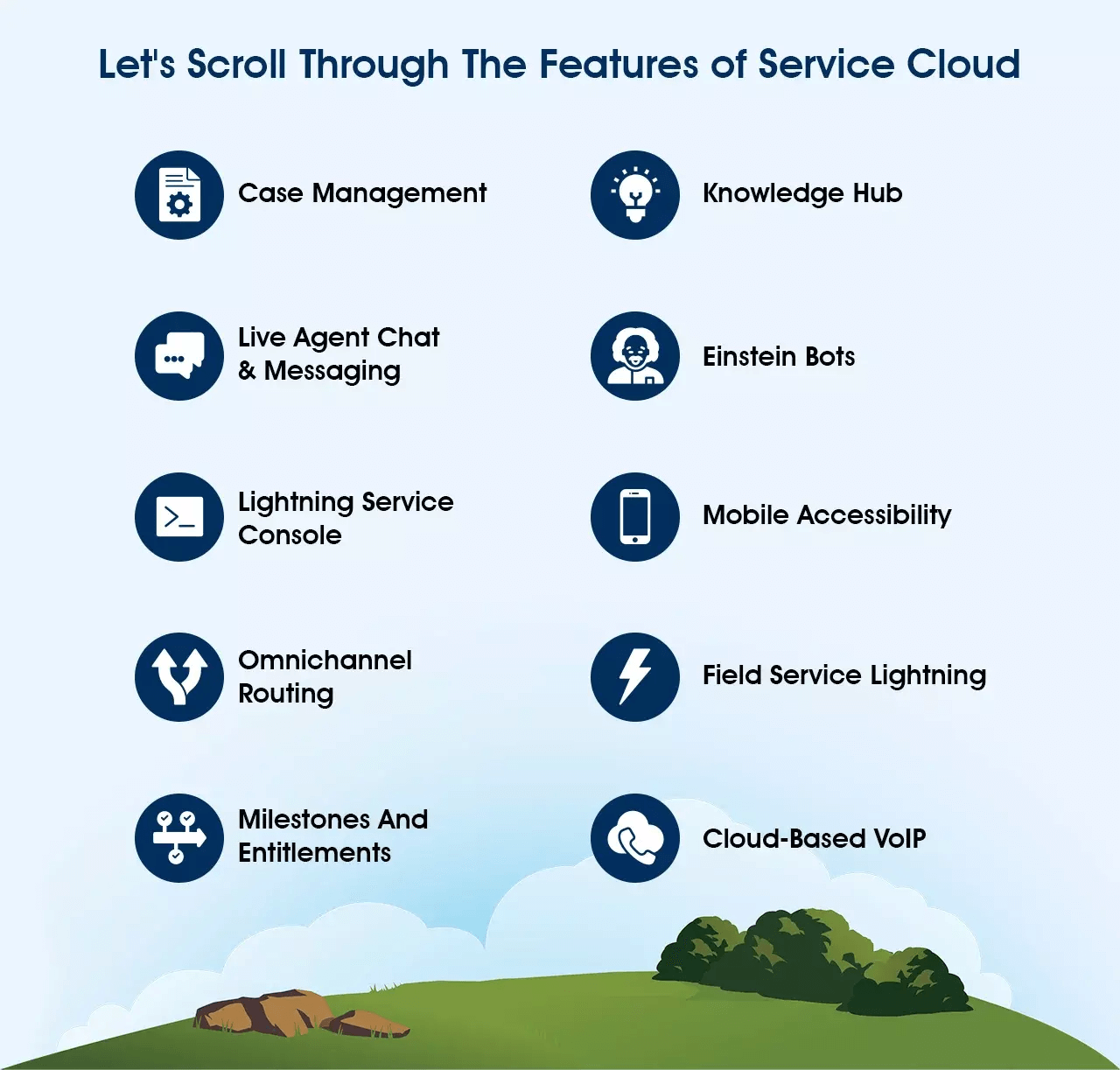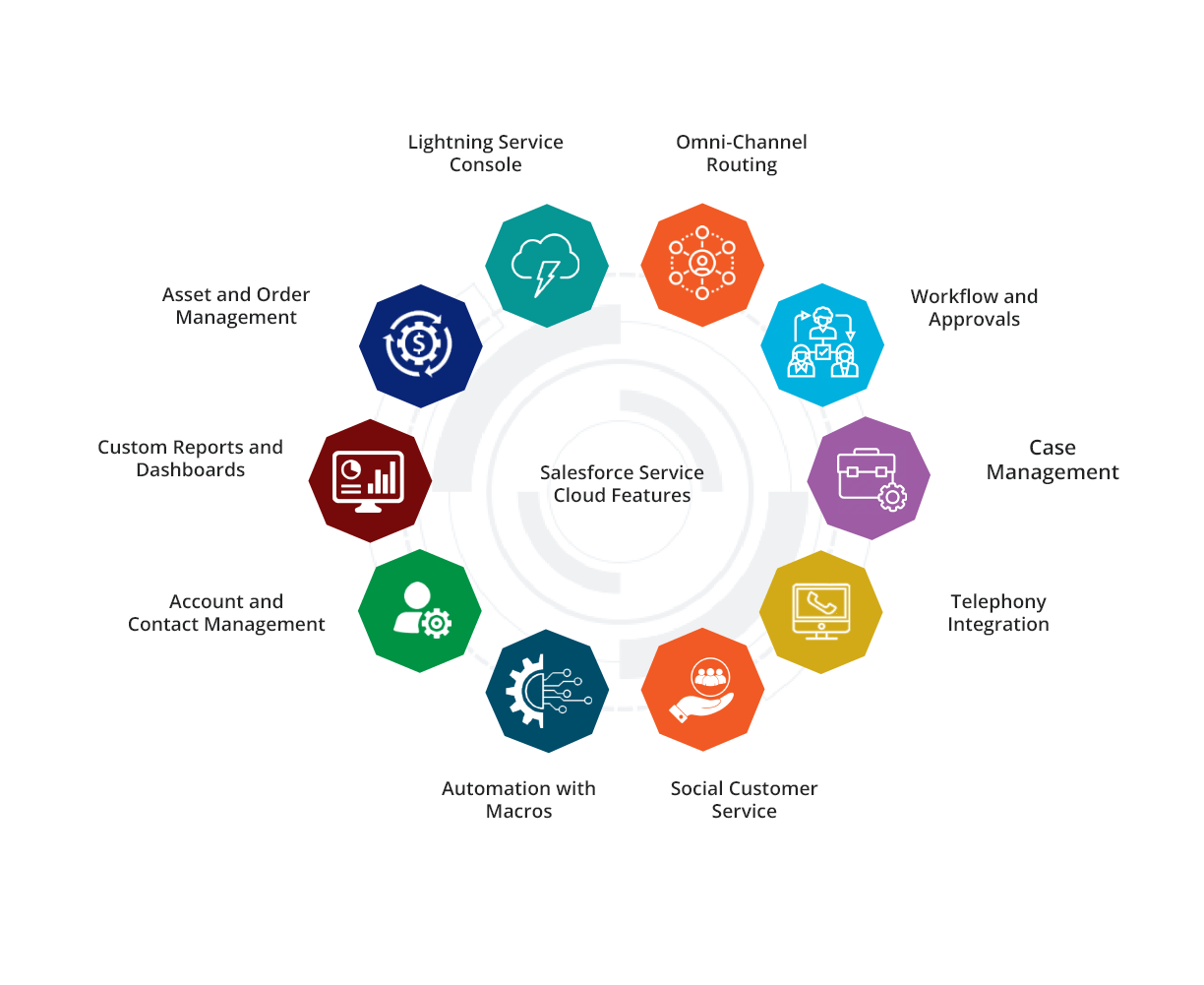Proactive Service as the New Standard
in Customer Satisfaction
In an era where customer satisfaction can make or break a business, delivering exemplary customer service has never been more crucial. Gone are the days when customer service was a reactive task; modern customers expect proactive service that anticipates and addresses their needs promptly. With the right customer service platform, companies can provide this level of service, leveraging automation and workflows to stay on top of key tasks and keep customers returning.
ServiceNow vs. Salesforce Service Cloud: A Comparative Analysis
When it comes to choosing a customer service platform, the battle often boils down to two heavyweights: ServiceNow and Salesforce’s Service Cloud. To navigate the strengths and weaknesses of these platforms, let’s dive deep into what they offer, their ideal use cases, and where they might fall short.
ServiceNow: The ITSM Specialist
ServiceNow has carved out a significant niche in IT service management (ITSM). Its capabilities for automating routine IT tasks and streamlining incident response processes are top-notch. The platform’s adherence to ITIL (Information Technology Infrastructure Library) standards makes it an attractive option for organizations with complex IT processes that seek to improve their internal IT services.
ServiceNow excels in scenarios where IT services are the backbone of a company’s operations. For example, in industries like banking, healthcare, and government, where IT governance, risk, and compliance are paramount, ServiceNow is often the platform of choice.
However, it is not without its limitations. ServiceNow’s interface can be less intuitive compared to other solutions, potentially leading to a steeper learning curve for users. Customization, while robust, tends to be complex and might require a dedicated specialist to manage. This is also where implementation and maintenance costs can start to creep in, because, at the end of the day, these will all depend on your exact needs and how your business operates.

Service Cloud: A Customer-Centric Approach
Conversely, Salesforce’s Service Cloud is built with a broader vision of customer service in mind. Its design considers the entire customer service ecosystem, providing a more holistic approach, one that is more centered around the end-user customer. Service Cloud shines in its ability to deliver robust automation and case management features, which empower agents with the right information at the right moment, and a lot of this power comes from a tight integration with a powerful CRM.
Its true strength lies in its flexibility and the seamless integration capabilities it offers. Service Cloud can be tailored to support a variety of business processes and workflows, spanning internal/ITSM flows, B2B customer and partner service flows, and B2C service flows, making it a suitable choice for any business that aims to make customer service a part of its brand promise.

The Flexibility of Service Cloud
Service Cloud’s adaptability sets it apart. It is not just customer service software; but a platform upon which a business can build and configure a solution that caters precisely to its needs. Whether a company requires a simple ticketing system or a complex, multi-channel customer service engine, Service Cloud can be customized to fit those requirements.
Its flexibility is further enhanced when you consider the Salesforce ecosystem. The platform doesn’t exist in a silo; it is part of a larger suite of applications that can work in concert to extend its capabilities, connecting natively to Marketing, Sales, Order Management, Billing, and other types of platforms. This interconnectivity allows Service Cloud to function as the centerpiece of a holistic customer service strategy.

Cost Comparison: ServiceNow and Service Cloud
Understanding the cost implications of ServiceNow and Salesforce Service Cloud is crucial for businesses making an informed decision. At first glance, the pricing models of both platforms may seem similar, operating on a subscription-based framework. However, delving deeper reveals nuances that could significantly impact the total cost of ownership for your organization.
ServiceNow, renowned for its robust ITSM capabilities, typically targets larger enterprises with more complex IT needs. Its pricing is often tailored to the scale and specific requirements of such organizations, which can make it a more substantial investment, especially for businesses seeking extensive customization and integration. The platform’s complexity and advanced features, while valuable, might also necessitate additional investment in training and skilled personnel to manage and utilize it effectively.
On the other hand, Salesforce Service Cloud adopts a more tiered pricing approach, offering various editions like Essentials, Professional, Enterprise, and Unlimited, each escalating in features and cost. This tiered structure allows businesses to select a plan that aligns with their size and specific customer service needs, potentially offering a more cost-effective solution for small to medium-sized enterprises or those with less complex requirements. However, it’s important to note that the costs can quickly increase with additional customizations, integrations, and bundling with other Salesforce products (though, it should be stated that this very bundling demonstrates a highly competitive advantage over ServiceNow and is representative of typically a lower TCO across various platforms including Sales, Service, and Marketing).
In summary, while ServiceNow might present a higher initial cost, particularly for larger, IT-heavy organizations requiring a comprehensive ITSM solution, Salesforce’s Service Cloud offers a more scalable approach, in both platform capabilities and in pricing, potentially making it more accessible for a broader range of businesses. However, the final cost for both platforms will significantly depend on your organization’s specific needs, scale, and customization requirements.

Beyond Service: The Salesforce Ecosystem Advantage
Choosing Service Cloud is about embracing an ecosystem that can grow and evolve with your company. Salesforce is renowned for its extensive suite of applications, including Experience Cloud, CRM Analytics, Sales Cloud, and Marketing Cloud. When combined with Service Cloud, these applications can profoundly augment service capabilities.
For instance, Experience Cloud can help create engaging, branded online spaces for customers to connect and find support, while CRM Analytics provides deep insights into customer behavior and service trends. Sales Cloud can integrate seamlessly to ensure that customer service and sales teams are aligned, providing a unified customer journey.
The V2 Strategic Advisors Difference
At V2 Strategic Advisors, we understand that transitioning to a new customer service platform is a significant decision. Our expertise as a Salesforce partner allows us to not only recommend Service Cloud but to customize it to the unique requirements of your business.
We assist businesses in crafting a seamless transition from ServiceNow to Service Cloud. Our approach involves a thorough analysis of your current processes, a detailed roadmap for implementation, and ongoing support to ensure success.
Your Path to Unmatched Customer Service Excellence
In summary, while ServiceNow has its strengths, especially in the ITSM space, Service Cloud’s flexibility and the extensive Salesforce ecosystem it taps into make it an unparalleled choice for businesses aiming for customer service excellence.
Building Trust Starts With A Conversation.
We invite you to connect with V2 Strategic Advisors. Together, we can explore the possibilities Service Cloud offers, ensuring that your move from ServiceNow is not just a change, but a strategic enhancement of your customer service capabilities.
In the end, it’s about finding a solution that not only meets your current needs but also propels you towards future growth and helps create new opportunities for your team.


